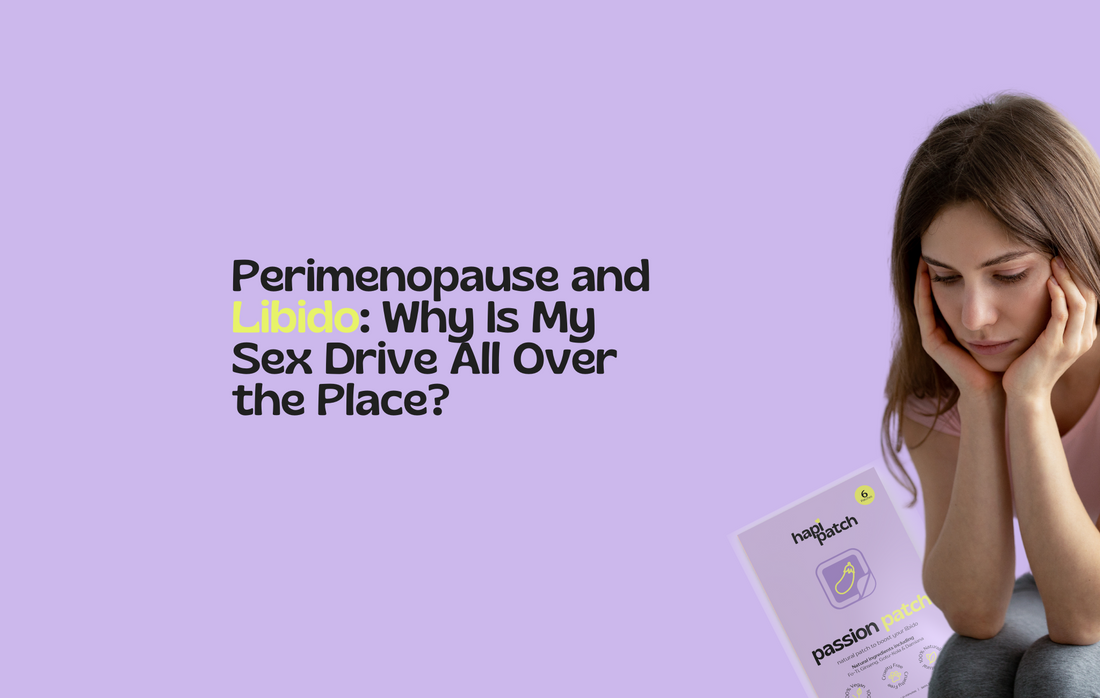Perimenopause can feel like a rollercoaster for many women, especially when it comes to sex drive. One moment, you might feel more sexually alive than ever, and the next, your libido may plummet to zero. These fluctuations can be confusing, frustrating, and may even cause emotional strain in relationships. But rest assured, you’re not alone. Many women experience significant changes in their libido during perimenopause, and there are natural ways to manage these changes.
In this blog, we’ll explore why your sex drive fluctuates during perimenopause, the hormonal changes that influence libido, and how you can naturally support a more balanced sex drive. We’ll also discuss how The Passion Patch can help stabilise your libido and keep you feeling in control of your sexual health.
Understanding Perimenopause: A Time of Change
Perimenopause is the transitional phase before menopause, typically occurring in women between their 40s and 50s. It can last anywhere from a few months to over a decade. During this phase, your hormone levels—especially oestrogen, progesterone, and testosterone—start to fluctuate unpredictably. These changes are responsible for a variety of symptoms, including hot flashes, mood swings, irregular periods, and, of course, changes in libido.
The hormonal fluctuations during perimenopause can cause your sex drive to vary from day to day, or even hour to hour. While this is a natural part of aging, it can be incredibly frustrating when it feels like your body is no longer in sync with your desires.
Why Is My Libido Fluctuating During Perimenopause?
Libido is closely tied to hormone levels, and during perimenopause, these hormones are constantly fluctuating. Understanding the roles of these hormones can help explain why your sex drive may feel erratic during this time.
- Oestrogen Levels
Oestrogen plays a key role in maintaining vaginal health and sexual desire. During perimenopause, oestrogen levels start to drop, leading to symptoms such as vaginal dryness, discomfort during sex, and a reduced interest in sexual activity. As oestrogen fluctuates, you may notice that your libido increases when your levels are higher and decreases when they drop.
- Progesterone Fluctuations
Progesterone works alongside oestrogen to regulate the menstrual cycle and support overall reproductive health. Low levels of progesterone can lead to mood swings, anxiety, and difficulty sleeping—all of which can negatively impact your libido. If you’re feeling irritable or anxious, it’s natural for your sexual desire to take a hit.
- Testosterone Decline
Though often thought of as a “male hormone,” testosterone is equally important for women’s sexual health. It helps regulate libido, energy, and mood. During perimenopause, testosterone levels begin to decline, which can lead to a noticeable drop in sexual desire and overall vitality.
The Emotional Impact of Fluctuating Libido
In addition to the physical changes that occur during perimenopause, the emotional toll of fluctuating hormones can also affect your libido. Perimenopause is often accompanied by mood swings, anxiety, and feelings of frustration or sadness. These emotional changes can make it difficult to feel connected to your partner or to engage in sexual activity, even when your physical desire is present.
Many women also experience changes in body image during perimenopause, which can impact self-esteem and sexual confidence. Weight gain, changes in skin elasticity, and other physical changes may lead to feelings of insecurity, further dampening sexual desire.
Common Perimenopausal Symptoms That Impact Libido
The hormonal fluctuations of perimenopause can cause a variety of symptoms that directly affect your sex drive. These symptoms may include:
- Vaginal dryness: The decline in oestrogen levels can cause the vaginal tissue to become thinner and less lubricated, making sex uncomfortable or painful.
- Fatigue: Low energy levels are common during perimenopause, particularly if you’re experiencing sleep disturbances like night sweats or insomnia. Feeling tired can make it difficult to engage in or enjoy sex.
- Mood swings and anxiety: Fluctuating hormones can lead to unpredictable mood swings, anxiety, or irritability, making it harder to feel emotionally connected to your partner or interested in intimacy.
Natural Ways to Stabilise Your Libido During Perimenopause
While fluctuating libido is a natural part of perimenopause, there are steps you can take to help stabilise your sex drive and maintain a fulfilling sexual relationship.
- Exercise Regularly
Exercise is one of the most effective ways to support hormonal balance and improve libido. Physical activity helps boost energy levels, improve mood, and increase circulation—all of which are essential for a healthy sex drive. Strength training, yoga, and cardiovascular exercise are particularly beneficial for maintaining hormonal health and improving sexual desire.
- Eat a Hormone-Supportive Diet
Your diet plays a significant role in maintaining hormonal balance. A hormone-supportive diet includes foods rich in omega-3 fatty acids, magnesium, and zinc. These nutrients help support hormone production and improve energy levels, making it easier to maintain a consistent libido. Foods to include are:
- Fatty fish (such as salmon and mackerel): High in omega-3s to support hormonal balance.
- Leafy greens (such as spinach and kale): Packed with magnesium, which reduces stress and supports hormone production.
- Nuts and seeds: Rich in zinc and magnesium, both of which are essential for sexual health.
- Reduce Stress
Chronic stress increases cortisol levels, which can suppress the production of testosterone and oestrogen, leading to a reduced sex drive. Reducing stress through mindfulness, yoga, or meditation can help lower cortisol levels and improve your libido. Taking time for relaxation and self-care is essential for stabilising sexual desire during perimenopause.
- Prioritise Sleep
Hormonal changes during perimenopause can often disrupt sleep patterns, leaving you feeling fatigued. Prioritising quality sleep is crucial for supporting hormone regulation and maintaining libido. Create a calming bedtime routine, limit screen time before bed, and ensure your sleeping environment is conducive to rest.
- Use Lubricants or Vaginal Moisturisers
If vaginal dryness is making intercourse uncomfortable, using a lubricant or vaginal moisturiser can help make sex more enjoyable. These products can alleviate discomfort caused by declining oestrogen levels, allowing you to maintain sexual activity and enjoy intimacy.
How The Passion Patch Can Help Stabilise Libido During Perimenopause
For women experiencing fluctuating libido during perimenopause, The Passion Patch offers a natural and effective solution. Designed with a blend of eight powerful ingredients, The Passion Patch supports hormonal balance, enhances blood flow, and boosts energy—helping to stabilise your libido during this unpredictable time.
Key Ingredients in The Passion Patch:
- Tribulus Terrestris: Known for increasing testosterone levels, this herb helps restore libido and improve sexual performance.
- Ginseng Extract: Ginseng reduces stress and fatigue, making it easier to engage in physical intimacy.
- L-Arginine: L-Arginine improves circulation, which is essential for physical arousal and sexual pleasure.
How Transdermal Delivery Helps:
The 4-layered matrix design of The Passion Patch ensures that these ingredients are delivered directly into your bloodstream, bypassing the digestive system for faster and more effective results. With a steady release of ingredients over 24 hours, The Passion Patch provides consistent support for libido, helping you feel more in control of your sexual health.
FAQ: Perimenopause and Libido Fluctuations
- Why does my libido fluctuate during perimenopause?
During perimenopause, hormone levels—especially oestrogen, progesterone, and testosterone—fluctuate unpredictably. These hormonal changes can cause your libido to vary from day to day.
- How can I stabilise my libido naturally?
Exercise regularly, eat a hormone-supportive diet, reduce stress, prioritise sleep, and use lubricants to improve comfort during sex. These lifestyle changes can help stabilise your libido during perimenopause.
- Can The Passion Patch help stabilise my libido?
Yes, The Passion Patch contains natural ingredients that support hormonal balance, improve circulation, and enhance sexual desire, helping to stabilise your libido during perimenopause.
- What are the most common symptoms of perimenopause that affect libido?
Vaginal dryness, fatigue, mood swings, and anxiety are some of the most common symptoms of perimenopause that can affect libido.
- How long does perimenopause last?
Perimenopause can last anywhere from a few months to over 10 years, depending on the individual. It typically begins in a woman’s 40s but can start earlier or later.

